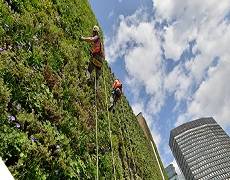September 13, 2013
UK’s leading political parties criticised for a lack of environmental leadership
 Britain’s leading political parties are failing to provide visible and consistent green leadership, threatening two decades of steady environmental policy progress in the UK, warns an influential group of charities today. In The Green Standard 2013, seven leading charities, including WWF, the Green Alliance, Greenpeace and Campaign for Better Transport, assess the green performance of coalition ministers and Labour shadow ministers since the last general election, reviewing the parties on four key areas: the economy, communities, nature and international leadership. The report concludes that none of the parties has a coherent environmental programme and there is no consistent public leadership on the environment from any of the party leaders. More →
Britain’s leading political parties are failing to provide visible and consistent green leadership, threatening two decades of steady environmental policy progress in the UK, warns an influential group of charities today. In The Green Standard 2013, seven leading charities, including WWF, the Green Alliance, Greenpeace and Campaign for Better Transport, assess the green performance of coalition ministers and Labour shadow ministers since the last general election, reviewing the parties on four key areas: the economy, communities, nature and international leadership. The report concludes that none of the parties has a coherent environmental programme and there is no consistent public leadership on the environment from any of the party leaders. More →























September 12, 2013
When it comes to transparency, most businesses might fail The Peacock Test
by Simon Heath • Comment, Workplace
[embedplusvideo height=”180″ width=”220″ editlink=”https://bit.ly/16me1M8″ standard=”https://www.youtube.com/v/TYQvVUDeZEo?fs=1&hd=1″ vars=”ytid=TYQvVUDeZEo&width=220&height=180&start=&stop=&rs=w&hd=1&autoplay=0&react=1&chapters=¬es=” id=”ep1269″ /]
The HR profession took a savaging yesterday in a Daily Telegraph article by Louisa Peacock following what many felt to be a disastrous appearance by the BBC’s head of HR, Lucy Adams in front of the Public Accounts Committee. You can see a brutal excerpt above. A thread of sensationalism runs through the Telegraph piece but some good points are made that have broader lessons for the commercial world. There have been acres of coverage generated by the debacle at the Beeb, but there is a real sense of “there but for the grace of God go I” and schadenfreude about much of the commentary and chatter from the business community.
More →